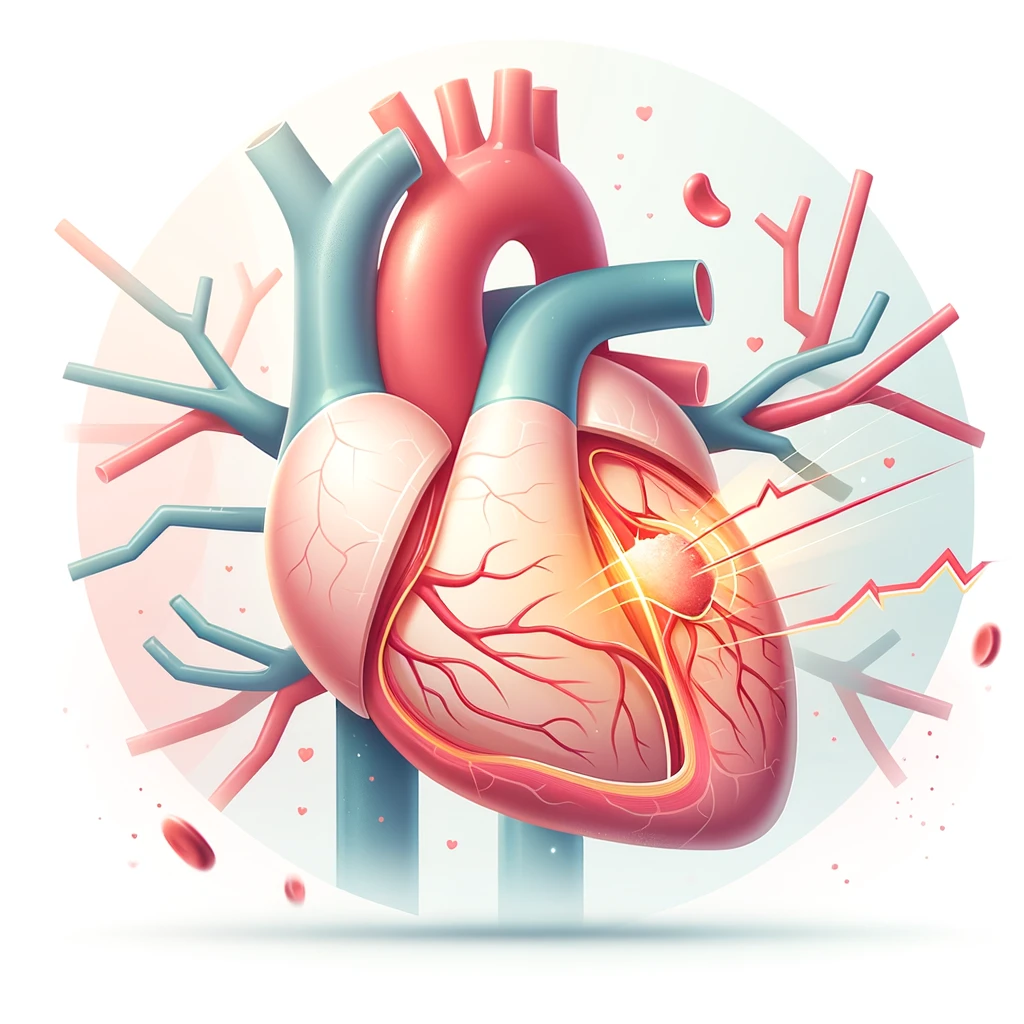2. What Happens During A Heart Attack?
When a heart attack occurs, blood flow to a portion of the heart stops or drops far below normal, causing damage or death to that portion of the heart muscle. When a portion of your heart is unable to pump due to lack of blood flow, it might interrupt the pumping sequence for the entire heart. These lowers or even halts the blood flow to the rest of the body, which can be fatal if not treated immediately.
3. What Are The Signs Of A Heart Attack?
Some signs of heart attacks are more prevalent than others.
Chest pain (angina). This might be slight and manifest as discomfort or weight, or it can be severe and manifest as crushing pain. It may originate in your chest and progress to other locations, such as your left arm (or both arms), shoulder, neck, jaw, back, or waist.
Breathlessness or difficulty breathing.
Fatigue.
Difficulty sleeping (insomnia).
Nausea or abdominal distress. Heart attacks are frequently confused with indigestion or heartburn.
Cardiac palpitations
Anxiety and a sense of “imminent disaster”
Sweating.
Lightheadedness, Vertigo, or Fainting out.
4. Risk Factors Linked To Heart Attack-
These are the primary risk factors that raise the likelihood of a heart attack:
Diabetes mellitus
Elevated blood pressure
Cigarette smoking
Elevated blood cholesterol
Overweight
Physical sedentarism
Age heightens the danger of heart attack
Heart attack or coronary artery-opening operation history in the past
Ancestry of premature heart disease
Eating unhealthful, high-fat and high-sodium foods
5. What Causes Heart Attack?
The overwhelming majority of heart attacks are caused by a blockage in one of the blood arteries supplying the heart. Plaque, a sticky substance that can build up on the inside walls of your arteries, is generally responsible (similar to how pouring grease down your kitchen sink can clog your home plumbing). This accumulation is known as atherosclerosis.
Plaque deposits within the coronary (heart) arteries can sometimes burst, causing a blood clot to become lodged at the site of the rupture. If the clot obstructs the artery, it can deprive the heart muscle of oxygen-rich blood, resulting in a heart attack.
It is possible to have a heart attack without a blockage, although it is uncommon and accounts for only approximately 5% of all heart attacks. This type of heart attack may be caused by the following:
Spasm of the coronary artery.
Rare medical problems, such as any ailment that involves abnormal constriction of the blood vessels.
Trauma: This includes coronary artery rips or ruptures.
Obstruction that originated elsewhere in the body: A blood clot or air bubble that becomes lodged in a coronary artery (embolism).
Electrolyte imbalance.
Eating disorders can eventually cause a heart attack by causing heart damage over time.
Takotsubo cardiomyopathy or stress cardiomyopathy.
Anomalous coronary arteries: A congenital heart abnormality in which the coronary arteries are positioned differently than usual throughout the body. This leads to a heart attack when compressed
6.How Are Heart Attacks Identified?
Anyone experiencing symptoms of a heart attack should have a physical examination, which includes checking pulse, blood oxygen levels, and blood pressure, as well as listening to heart and lung sounds.A heart attack is diagnosed using the following criteria:
History and symptoms: The provider will inquire about your symptoms. They may also ask someone who was present to describe what occurred.
Blood tests: Damage to heart muscle cells during a heart attack almost always causes a chemical marker, a cardiac troponin, to appear in your bloodstream. Blood tests for that marker are among the most reliable ways to diagnose a heart attack.
Electrocardiogram: When you go to the ER with heart attack symptoms, one of the first tests you get is an electrocardiogram (EKG or ECG).
Echocardiogram: An echocardiogram creates a picture of the inside and outside of your heart using ultrasound (high-frequency sound waves).
Angiogram: This test detects areas of low or no blood flow.
Heart computed tomography (CT) scan: This produces a high-resolution image of your hea
Heart MRI: This test creates an image of your heart using a powerful magnetic field and computer processing.
Nuclear heart scans: These scans, like angiography, use a radioactive dye injected into your blood. They differ from an angiogram in that they employ computer-assisted methods such as computed tomography (CT) or positron emission tomography (PET) scans.
7. How To Lower Chances Of Having A Heart Attack?
CAlthough there are several risk factors over which you have no control, there are many things you can do to help yourself and reduce your chances of having a heart attack.
Tobacco products, including smokeless tobacco and e-cigarettes, should be avoided.
You should try to get at least 30 minutes of moderately vigorous physical activity on at least five days a week.
Try adopting a healthier eating pattern, such as the Dash or Mediterranean diet. One viable option is switching to a plant-based diet.
Keep your weight where it should be, if you want to know what a healthy weight is for you, and get some help figuring out how to get there, talk to your primary care doctor.
Take care of your preexisting medical conditions, including high blood pressure, diabetes, and high cholesterol levels fall under this category.
Take a deep breath and relax, you could try some relaxation methods like yoga or meditation.
Don’t forget to take your medicine, do not wait until you need to take medication or have an upcoming doctor’s appointment to start doing so.
Don’t miss out on any of your doctor’s visits, regular checkups with your doctor can reveal any hidden heart problems or other health issues. Also, this can aid in diagnosing and fixing issues before they worsen.
